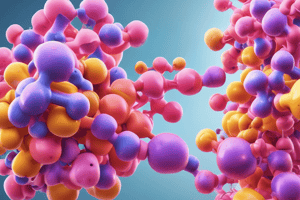Podcast
Questions and Answers
What is the drug class of Allopurinol?
What is the drug class of Allopurinol?
- Antidepressant
- Antigout: uric acid biosynthesis inhibitor (correct)
- Antibiotic
- Antihypertensive
Which of the following are contraindications for Allopurinol? (Select all that apply)
Which of the following are contraindications for Allopurinol? (Select all that apply)
- Hepatic disorder caution (correct)
- Hypersensitivity (correct)
- Severe renal disease (correct)
- Mild liver dysfunction
What are some drug interactions associated with Allopurinol?
What are some drug interactions associated with Allopurinol?
Increases effects of warfarin, phenytoin, theophylline, anticancer drugs, ACE inhibitors; increases rash with ampicillin, amoxicillin; increases toxicity with thiazide diuretics; decreases effect with antacids.
What effect does Allopurinol have on lab tests?
What effect does Allopurinol have on lab tests?
What is the PO onset of Allopurinol?
What is the PO onset of Allopurinol?
What is the primary therapeutic use of Allopurinol?
What is the primary therapeutic use of Allopurinol?
What is the mode of action of Allopurinol?
What is the mode of action of Allopurinol?
Which of the following are common side effects of Allopurinol? (Select all that apply)
Which of the following are common side effects of Allopurinol? (Select all that apply)
What are some life-threatening adverse reactions associated with Allopurinol?
What are some life-threatening adverse reactions associated with Allopurinol?
Why is sufficient renal function needed for patients taking antigout drugs?
Why is sufficient renal function needed for patients taking antigout drugs?
Why is it important for patients to have regular CBC tests while on Allopurinol?
Why is it important for patients to have regular CBC tests while on Allopurinol?
What should the nurse monitor while the patient is taking Allopurinol?
What should the nurse monitor while the patient is taking Allopurinol?
Why should patients have a yearly eye examination while on Allopurinol?
Why should patients have a yearly eye examination while on Allopurinol?
What dietary restrictions should patients taking Allopurinol adhere to?
What dietary restrictions should patients taking Allopurinol adhere to?
What foods high in purine should the patient avoid while taking Allopurinol?
What foods high in purine should the patient avoid while taking Allopurinol?
Flashcards are hidden until you start studying
Study Notes
Drug Class
- Allopurinol belongs to the antigout drug class and functions as a uric acid biosynthesis inhibitor.
Contraindications
- Contraindicated in patients with hypersensitivity and severe renal disease.
- Caution is advised for individuals with hepatic disorders.
Drug Interactions
- Enhances the effects of warfarin, phenytoin, theophylline, anticancer medications, and ACE inhibitors.
- Risk of increased rash when combined with ampicillin or amoxicillin.
- Toxicity risk elevated when used with thiazide diuretics.
- Effectiveness may be reduced if taken with antacids.
Lab Interactions
- Can lead to increased levels of AST, ALT, and BUN in laboratory tests.
Oral Onset
- Oral administration leads to effects within 0.5 to 1 hour.
Therapeutic Effects/Uses
- Used primarily to treat gout and hyperuricemia and to prevent urate calculi formation.
Mode of Action
- Works by reducing uric acid synthesis in the body.
Side Effects
- Common side effects include anorexia, nausea, vomiting, diarrhea, stomatitis, dizziness, headache, rash, pruritus, malaise, metallic taste, diaphoresis, edema, erectile dysfunction, and peripheral neuropathy.
Life-Threatening Adverse Reactions
- Potentially severe reactions include bone marrow depression, aplastic anemia, thrombocytopenia, neutropenia, agranulocytosis, and leukopenia.
- May also cause cataracts, retinopathy, bradycardia, and depression.
Renal Function Requirement
- Adequate renal function is essential for excretion, as antigout drugs are primarily eliminated via the kidneys.
Patient Monitoring
- Patients should maintain regular medical appointments and lab tests for renal, liver, and CBC functions due to the risk of blood dyscrasias associated with some antigout medications.
Nurse Monitoring Responsibilities
- Monitor GI symptoms, reporting any gastric pain, nausea, vomiting, or diarrhea.
- Record urine output and conduct lab tests for renal and liver function (including BUN, serum creatinine, ALP, AST, ALT).
Eye Examination Recommendation
- Yearly eye exams are advised due to the potential for visual changes from prolonged allopurinol use.
Dietary Instructions
- Advise patients to avoid alcohol and caffeine as they can elevate uric acid levels.
- Large doses of vitamin C should be avoided to prevent kidney stones.
- Encourage avoidance of high-purine foods, which can increase uric acid levels.
High-Purine Foods to Avoid
- Foods to avoid include organ meats, salmon, sardines, gravy, and legumes to help manage uric acid levels.
Studying That Suits You
Use AI to generate personalized quizzes and flashcards to suit your learning preferences.




